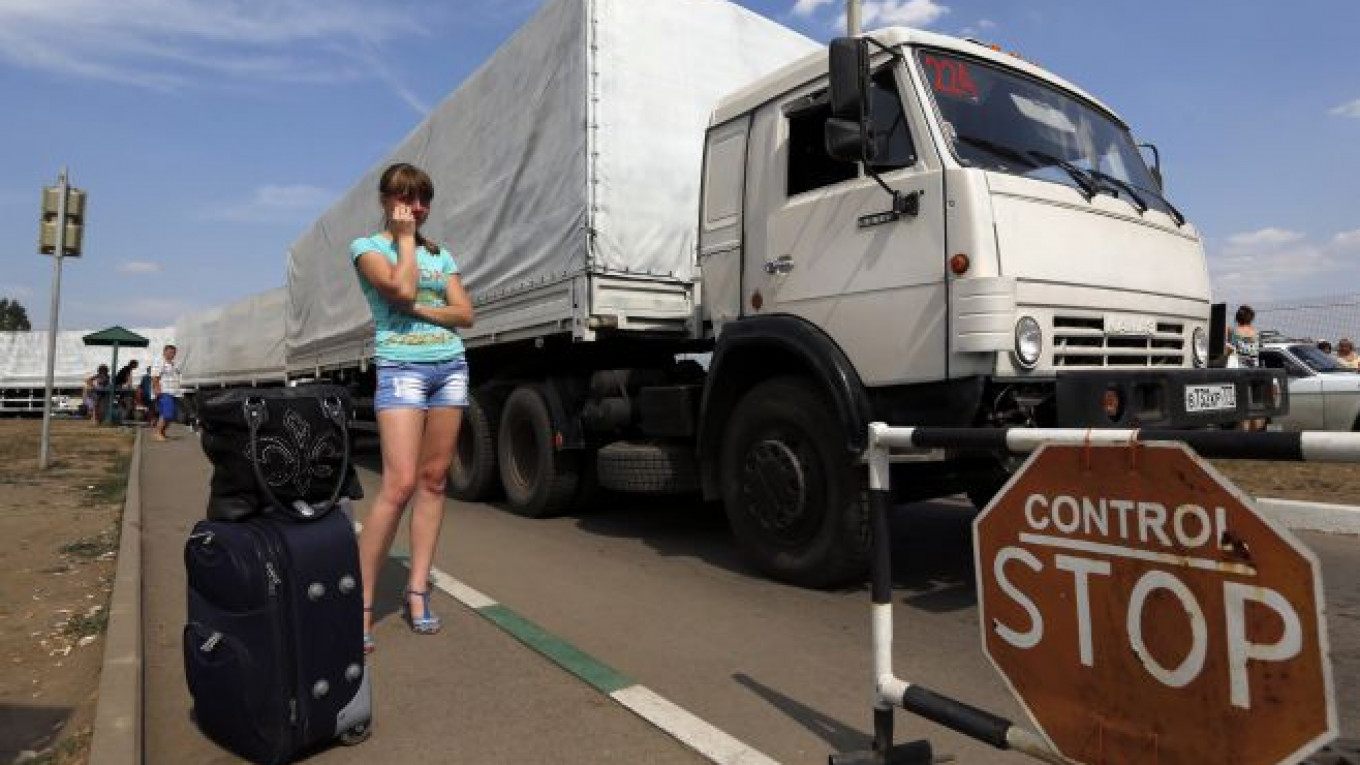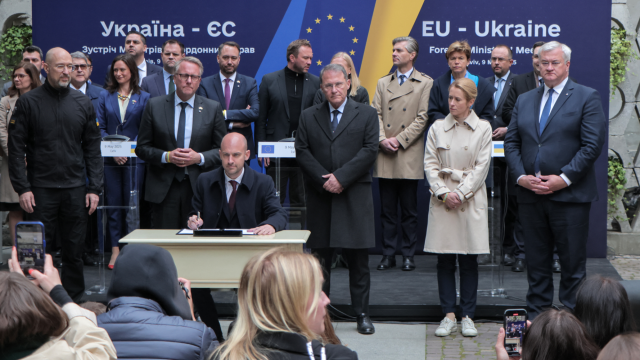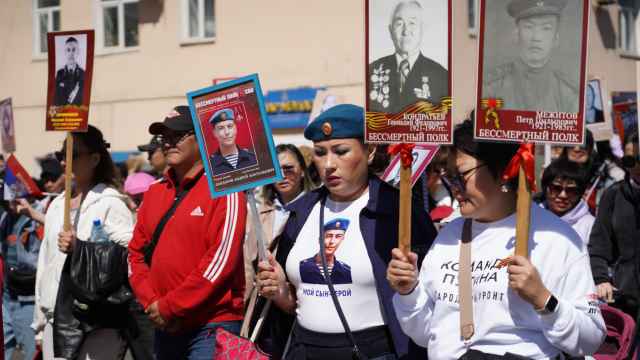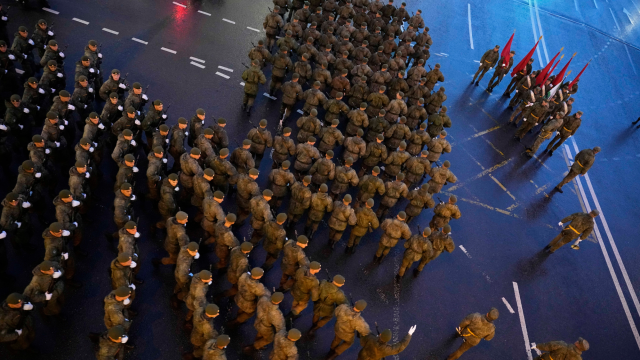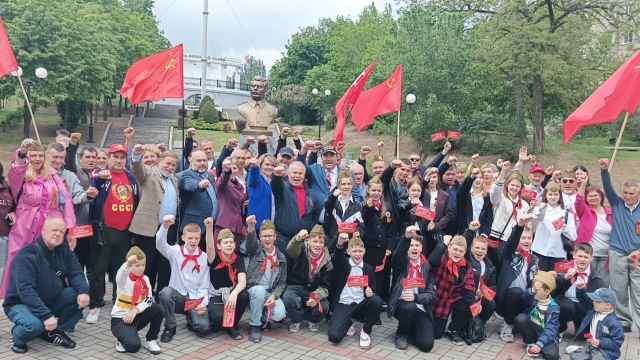Ukraine declared on Friday that Russia had launched a "direct invasion" of its territory after Moscow sent a convoy of aid trucks across the border into eastern Ukraine where pro-Russian rebels are fighting government forces.
Moscow, which has thousands of troops close to the Russian side of the border, warned against any attempt to "disrupt" the convoy it said was a purely humanitarian operation; but it did not say what action it might take if Kiev's military intervened.
The EU urged Russia to reverse what it called a clear violation of the Ukrainian border.
Ukrainian President Petro Poroshenko described the entry of the trucks without Kiev's permission as a "flagrant violation of international law."
But a senior security chief said Ukrainian forces would not attack the trucks, and had allowed them in, even without proper clearance, to avoid "provocations".
Kiev called on international allies to unite in "a decisive condemnation of illegal and aggressive actions" by Russia.
Poroshenko said more than 100 trucks had crossed the border, of which only some had been checked earlier by Ukrainian officials inside Russian territory. Other Ukrainian officials said only 34 or 35 of them had been properly checked.
Repeating earlier suspicions by Kiev that the aid cargo could be somehow used to support the separatists, the foreign ministry said: "Neither the Ukrainian side nor the International Committee of the Red Cross knows the content of the trucks. This arouses special concern."
The fact that Russian vehicles had crossed into Ukraine without permission "testifies to the deliberate and aggressive character of actions by the Russian side," the ministry said.
A Reuters witness said the white-painted trucks had crossed onto Ukrainian soil and headed towards the rebel stronghold of Luhansk escorted by a small number of separatist fighters.
Mikhail Denikin, chairman of the village council in Izvarino, on the Ukrainian side of the border, stood by the road waving a large Russian flag as the trucks drove past.
"Big thanks to Russia. Our brothers did not forget us. We are brothers. That is the most important thing. We are Slavs, we are together," Denikin told Reuters Television.
A traffic police officer on the Russian side of the border, who had been escorting the aid convoy within Russian territory, said the entire convoy of about 260 trucks had crossed over into Ukraine. He said it was possible they would cross back into Russia on Friday evening after delivering their cargo.
"We consider this a direct invasion by Russia of Ukraine," Ukrainian state security chief Valentyn Nalivaychenko said in a statement to journalists.
Asked whether Ukraine would use air strikes against the convoy, Nalivaychenko said: "Against them, no."
But Ukrainian authorities said the convoy would pass through an area where the rebels were firing so its security could not be guaranteed. Interfax news agency said later that the first trucks had reached the rebel-held city of Luhansk.
"All excuses to delay sending aid have been exhausted," the Russian Foreign Ministry said Friday in a statement. "The Russian side has taken the decision to act."
"We warn against any attempts to disrupt this purely humanitarian mission...Responsibility for any possible consequences of provocations ... will lie, completely and entirely, with those who are prepared to further sacrifice human lives for the sake of their ambitions and geo-political ploys."
Red Cross Declines to Escort
The International Committee for the Red Cross, which both Moscow and Kiev had agreed should supervise the convoy, said it was not escorting it "due to the volatile security situation".
The entry of the trucks ran counter to the arrangement agreed with the ICRC, Sebastien Brabant, spokesman for the EU's foreign policy chief Catherine Ashton, said.
"This is a clear violation of the Ukrainian border," he said. We urge Russia to reverse its decision."
Kiev and Western capitals have expressed concern that the convoy could be used as a pretext for some form of direct Russian military intervention. Russia, at odds with Kiev since popular protests drove a pro-Russian president from office, denies the suggestion as absurd.
A Reuters cameraman said it had been possible to see inside some of the vehicles on Friday. The cargoes visible consisted of cardboard boxes with tinned food, pallets of bottled water, generators and other supplies.
Poroshenko said Thursday he would call on President Vladimir Putin to rein in pro-Russian separatists when the two men meet next week and told the Kremlin chief he had "a strong country, a strong army" behind him.
The Ukrainian and Russian presidential chiefs of staff spoke by telephone on Friday and agreed on the need for the swift completion of the aid delivery operation, Kremlin spokesman Dmitry Peskov said. It was not clear whether the conversation took place before the trucks crossed the border.
German Chancellor Angela Merkel is scheduled to visit Kiev on Saturday to show her support for Poroshenko — but diplomats say she is also bearing a message that he should consider calling a ceasefire so as not to incur a backlash from Putin.
In Donetsk pro-Russia separatist Denis Pushilin, guarded by men who identified themselves as Chechens, handed out aid —sugar, tea, canned beef and rice — and envelopes of money to three families in a state building in the city centre. The aid, collected in Russia by Russian citizens, he said was not connected to the aid crossing the border on Friday.
"Hopefully soon we'll be able to start handing out aid to hundreds if not thousands of more families in need," he said.
After four months of fighting in the industrial, Russian-speaking eastern Ukraine, the area faces a humanitarian crisis, lacking supplies of food, medicine and clean water.
See also:
A Message from The Moscow Times:
Dear readers,
We are facing unprecedented challenges. Russia's Prosecutor General's Office has designated The Moscow Times as an "undesirable" organization, criminalizing our work and putting our staff at risk of prosecution. This follows our earlier unjust labeling as a "foreign agent."
These actions are direct attempts to silence independent journalism in Russia. The authorities claim our work "discredits the decisions of the Russian leadership." We see things differently: we strive to provide accurate, unbiased reporting on Russia.
We, the journalists of The Moscow Times, refuse to be silenced. But to continue our work, we need your help.
Your support, no matter how small, makes a world of difference. If you can, please support us monthly starting from just $2. It's quick to set up, and every contribution makes a significant impact.
By supporting The Moscow Times, you're defending open, independent journalism in the face of repression. Thank you for standing with us.
Remind me later.


